In 1972 RCA released the first of a series of new performances of memorable music written for motion pictures up to that time. Charles Gerhardt was the conductor and the producer for the series was George Korngold, son of Erich Wolfgang Korngold. The first LP issued was The Sea Hawk: Classic Film Scores of Erich Wolfgang Korngold. Here was Korngold’s film music played with all the attention usually given only the “classics” - a full symphony orchestra, state of the art engineering and flawless processing. Gerhardt was an ideal choice as he had worked for RCA and Reader’s Digest and was responsible for titles that sold in the millions! He had already created his recording orchestra, The National Philharmonic, employing the finest available musicians and London’s best recording venues were used for the sessions. 12 more of The Classic Film Scores were issued from 1972 until 1976. They were released on CD after 1983 and some were re-issued with additional music not used on the LPs or the first CDs. All these still compelling performances have been caringly transferred from the original analogue tapes to digital masters for release on 13 individual CDs.
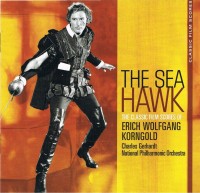 The first in the new series is, appropriately, The Sea Hawk (RCA 88697-77932) which sounds glorious. It is an impressive tribute to the orchestra, conductor and both the original recording engineer and the people responsible for the splendid remastered sound but mainly to the composer, the acknowledged wunderkind who came to Hollywood from Vienna. The CD has music from 11 more films, including Robin Hood, Captain Blood, Anthony Adverse, and Kings Row. Korngold has another CD in the series entitled “Elizabeth and Essex” with music from seven films including Prince and the Pauper, The Sea Wolf, and Of Human Bondage (88697-81266). Korngold appears again on Captain Blood, Classic Film Scores for Errol Flynn (88697-77934), with music by Korngold, Franz Waxman, Hugo Friedhofer and Max Steiner.
The first in the new series is, appropriately, The Sea Hawk (RCA 88697-77932) which sounds glorious. It is an impressive tribute to the orchestra, conductor and both the original recording engineer and the people responsible for the splendid remastered sound but mainly to the composer, the acknowledged wunderkind who came to Hollywood from Vienna. The CD has music from 11 more films, including Robin Hood, Captain Blood, Anthony Adverse, and Kings Row. Korngold has another CD in the series entitled “Elizabeth and Essex” with music from seven films including Prince and the Pauper, The Sea Wolf, and Of Human Bondage (88697-81266). Korngold appears again on Captain Blood, Classic Film Scores for Errol Flynn (88697-77934), with music by Korngold, Franz Waxman, Hugo Friedhofer and Max Steiner.
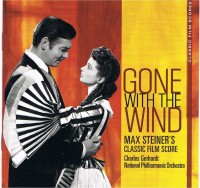 Steiner’s masterpiece, the unforgettable Gone with the Wind is heard almost complete, from the opening fanfare to the final apotheosis. To my mind, this remains the finest music of the genre (88697-77935). Also by Steiner, once a pupil of Brahms and Mahler, is “Now, Voyager” which also includes King Kong, The Big Sleep, The Fountainhead, The Informer, and others (88697-81270). “Casablanca” has scores for Bogart movies by Steiner, Waxman, Rozsa and Victor Young (88697-77937). “Sunset Boulevard” has eight of Waxman’s scores including Bride of Frankenstein (88697-81265).
Steiner’s masterpiece, the unforgettable Gone with the Wind is heard almost complete, from the opening fanfare to the final apotheosis. To my mind, this remains the finest music of the genre (88697-77935). Also by Steiner, once a pupil of Brahms and Mahler, is “Now, Voyager” which also includes King Kong, The Big Sleep, The Fountainhead, The Informer, and others (88697-81270). “Casablanca” has scores for Bogart movies by Steiner, Waxman, Rozsa and Victor Young (88697-77937). “Sunset Boulevard” has eight of Waxman’s scores including Bride of Frankenstein (88697-81265). 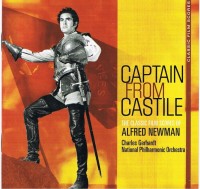 One of my favourites, Captain from Castile (88697-77936), also contains Alfred Newman’s stirring music for The Robe, Wuthering Heights, Anastasia, and six others. The last to be recorded was “Lost Horizon” with six of Dimitri Tiomkin’s beautiful scores (88697-77933). Spellbound (88967-81269) is devoted to nine scores by Miklos Rozsa including The Red House and Double Indemnity. “Citizen Kane” has five memorable scores by Bernard Hermann including Hangover
One of my favourites, Captain from Castile (88697-77936), also contains Alfred Newman’s stirring music for The Robe, Wuthering Heights, Anastasia, and six others. The last to be recorded was “Lost Horizon” with six of Dimitri Tiomkin’s beautiful scores (88697-77933). Spellbound (88967-81269) is devoted to nine scores by Miklos Rozsa including The Red House and Double Indemnity. “Citizen Kane” has five memorable scores by Bernard Hermann including Hangover 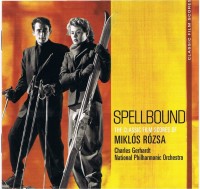 Square: the Concerto Macabre (88697-81264). “Bette Davis” has 12 scores written for her by Steiner, Korngold and Waxman (88607-81272). Finally, the odd man out... not the movie but the composer David Raksin, who conducts the Philharmonia Orchestra in his own music for Laura, The Bad and the Beautiful and Forever Amber (88697-81268).
Square: the Concerto Macabre (88697-81264). “Bette Davis” has 12 scores written for her by Steiner, Korngold and Waxman (88607-81272). Finally, the odd man out... not the movie but the composer David Raksin, who conducts the Philharmonia Orchestra in his own music for Laura, The Bad and the Beautiful and Forever Amber (88697-81268).
These composers did not write every note under their name. The studios all employed orchestrators on whom the composer relied to fill in the dots... in the style of. Just watch the credits... for example Edward Powell was Alfred Newman’s exclusive orchestrator for his movies.
Accolades for the people at Sony who revived this exceptional series from the golden age of classical recording.
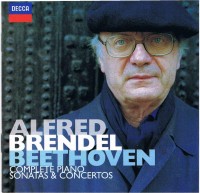 Alfred Brendel has retired from the concert stage, although we very recently heard him in Toronto’s Koerner Hall expounding on Beethoven’s humour in music, a favourite subject of his. His interpretations of Beethoven, recorded and re-recorded, continue to attract music lovers everywhere. Decca has re-packaged his Philips recordings made between 1970 and 1977 of the complete piano sonatas and the piano concertos (4782607). Many regard his interpretations of Beethoven during this period as the most interesting, his recordings garnering favourable reviews in a crowded field. As did, and do, the concertos with Bernard Haitink and the London Philharmonic Orchestra recorded when he was their principal conductor. The new set of 12 CDs costs less than the price of 3 discs when they were first issued.
Alfred Brendel has retired from the concert stage, although we very recently heard him in Toronto’s Koerner Hall expounding on Beethoven’s humour in music, a favourite subject of his. His interpretations of Beethoven, recorded and re-recorded, continue to attract music lovers everywhere. Decca has re-packaged his Philips recordings made between 1970 and 1977 of the complete piano sonatas and the piano concertos (4782607). Many regard his interpretations of Beethoven during this period as the most interesting, his recordings garnering favourable reviews in a crowded field. As did, and do, the concertos with Bernard Haitink and the London Philharmonic Orchestra recorded when he was their principal conductor. The new set of 12 CDs costs less than the price of 3 discs when they were first issued.
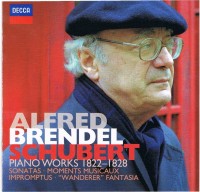 A second ultra-budget Brendel set from Decca is an all Schubert collection of the late piano sonatas, the Impromptus, the Wanderer Fantasy, the 16 German Dances and other gems recorded by Philips in 1987 and 1988 (4782622, 7 CDs). As in the Beethoven performances above, Brendel is also competing with his own earlier recordings. Collectors, of course, enjoy comparing performances while others simply want one good recording of a work. These polished, finely shaded performances reflect Brendel’s mature thoughts on this repertoire, excellently recorded.
A second ultra-budget Brendel set from Decca is an all Schubert collection of the late piano sonatas, the Impromptus, the Wanderer Fantasy, the 16 German Dances and other gems recorded by Philips in 1987 and 1988 (4782622, 7 CDs). As in the Beethoven performances above, Brendel is also competing with his own earlier recordings. Collectors, of course, enjoy comparing performances while others simply want one good recording of a work. These polished, finely shaded performances reflect Brendel’s mature thoughts on this repertoire, excellently recorded.
For a list of writings by this author, click the name above
More from this author:
 The first in the new series is, appropriately, The Sea Hawk (RCA 88697-77932) which sounds glorious. It is an impressive tribute to the orchestra, conductor and both the original recording engineer and the people responsible for the splendid remastered sound but mainly to the composer, the acknowledged wunderkind who came to Hollywood from Vienna. The CD has music from 11 more films, including Robin Hood, Captain Blood, Anthony Adverse, and Kings Row. Korngold has another CD in the series entitled “Elizabeth and Essex” with music from seven films including Prince and the Pauper, The Sea Wolf, and Of Human Bondage (88697-81266). Korngold appears again on Captain Blood, Classic Film Scores for Errol Flynn (88697-77934), with music by Korngold, Franz Waxman, Hugo Friedhofer and Max Steiner.
The first in the new series is, appropriately, The Sea Hawk (RCA 88697-77932) which sounds glorious. It is an impressive tribute to the orchestra, conductor and both the original recording engineer and the people responsible for the splendid remastered sound but mainly to the composer, the acknowledged wunderkind who came to Hollywood from Vienna. The CD has music from 11 more films, including Robin Hood, Captain Blood, Anthony Adverse, and Kings Row. Korngold has another CD in the series entitled “Elizabeth and Essex” with music from seven films including Prince and the Pauper, The Sea Wolf, and Of Human Bondage (88697-81266). Korngold appears again on Captain Blood, Classic Film Scores for Errol Flynn (88697-77934), with music by Korngold, Franz Waxman, Hugo Friedhofer and Max Steiner.







